People
Current members of the Whitelaw lab
Bruce Whitelaw
Group Leader
Email: bruce.whitelaw@roslin.ed.ac.uk
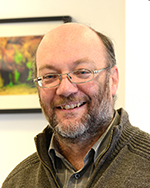
Bruce Whitelaw FRSB was awarded a BSc degree in Medical Microbiology (Virology elective) from the University of Edinburgh in 1982 and his PhD in 1987 from the University of Glasgow. His thesis title “The regulation of the myc proto-oncogene” focussed on the molecular biology of gene activation; a theme he has maintained throughout his career through the development and application of gene expression systems in transgenic animals. His first appointment was to the AFRC’s Animal Breeding Research Organisation working on the then novel idea of producing human pharmaceutical proteins in animal bioreactors. He subsequently held research position at the BBRSC’s Institute of Animal Physiology and Genetics Research, and then Roslin Institute.
Currently Bruce is Deputy Director of Partnerships at The Roslin Institute and Professor of Animal Biotechnology at the Royal (Dick) School of Veterinary Studies. Having pioneered the use of lentivirus vectors for transgene delivery, he is currently establishing robust methodology for genome editing in livestock.
Bruce actively seeks to apply this technology in the field of animal biotechnology. Specifically, he aims to exploit this knowledge to develop innovative biotechnological solutions to combat infectious disease in animals, evaluate new treatments of human disease through transgenic animal models, and establish efficient protein production systems in animals.
Simon Lillico
Research Fellow
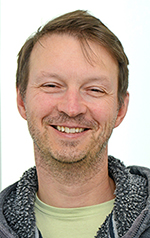
Email: simon.lillico@roslin.ed.ac.uk
Simon began his scientific career with a BSc in Biological Sciences with Honours Zoology from the University of Edinburgh, followed by a MSc in Applied Parasitology and Medical Entomology from the University of Liverpool. His PhD on African Trypanosomes from the University of Glasgow was followed by a postdoctoral position at the same institution. Changing subject matter entirely Simon joined The Roslin Institute in late 2002 to work on a joint academic/industry project making transgenic chickens that expressed therapeutic proteins in eggs, which gave him extensive experience in lentiviral transgenesis.
In 2007, he shifted his focus from chickens to livestock with fewer feathers and more legs (primarily sheep and pigs), using his expertise with lentiviruses to introduce transgenes to model human disease states. The rapid expansion of the field of genome editors over the last 5 years has made practicable genome modifications which had previously been unattainable. Simon has been at the forefront of application of these editors to livestock as tools to either create disease resilient livestock strains, or to generate more accurate models of human disease. He also has experience of working with TALENs, ZFNs and most recently CRISPR/Cas9 , through various collaborations involving key developers of the current tools (Sangamo), R & D companies in the livestock arena (Recombinetics Inc.), livestock breeding companies and international academic institutions.
Chris Proudfoot
Research Fellow

Email: chris.proudfoot@roslin.ed.ac.uk
Chris started his academic career with a BSc in Biochemistry-Microbiology from the University of Aberdeen, before completing a PhD in Molecular Parasitology at the University of Glasgow studying DNA repair and recombination in trypanosomes. His first postdoctoral position involved a move from parasitology to molecular genetics where he was involved in the generation of site specific recombinases for genome engineering applications. He then moved from Glasgow to Edinburgh to join the group of Bruce Whitelaw in 2011 where initial work was aimed at the generation of trypanosome resistant boran cattle using cloning technologies.
In recent years the focus of his work has centred on the generation of genome modified livestock, particularly utilizing genome editors, with an aim to improve disease resistance or the generating models of human diseases. Chris has experience of producing genome edited animals through the direct injection of ZFNs, TALENs and CRISPR/Cas9 into zygotes and was a member of the team that produced the first edited livestock using this method.
Sarah Fletcher
PhD student
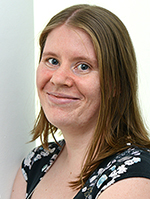
Email: Sarah.Fletcher@roslin.ed.ac.uk
Sarah joined the Whitelaw Group in September 2013 to investigate host resistance to Foot and Mouth Disease Virus after finishing her BSc in Biomedical Sciences at Newcastle University. While studying at Newcastle University she completed a summer research project investigating how the human gut microbiota is involved in the degradation of polysaccharides and a final year research project investigating the activation of telomerase in mouse epithelial cells.
She tends to do a lot of baking and also enjoys doing the odd sewing project out of the lab. She is also a moderator for a popular degu forum and creates content for degu-keeping.
Yue Du (Dina)
PhD student

Email: DuYue.Dina@ed.ac.uk
Dina is a CSC-funded PhD student evaluating strategies to reduce Influenza A virus infection in pig host cells at the level of host-pathogen interaction. She has an MSc research degree in animal embryonic engineering from the Key Laboratory of Animal Biotechnology, Ministry of Agriculture, based in Northwest A&F University, China, where her work in Professor Yong Zhang’s lab was focused on the functional study of sperm-borne microRNAs during early development of bovine SCNT embryos.
Alongside her PhD life, she enjoys reading, listening to music and hitting the gym.
LinkedIn: www.linkedin.com/in/yue-du
Akshay Joshi
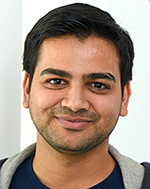
PhD student
E-mail: akshay.joshi@ed.ac.uk
Akshay joined the Roslin Institute as a PhD student in September 2015, where he is working towards understanding the regulation of milk proteins in mouse using CRISPRs. He received his Master’s degree in Microbiology from Bikaner University (India) in 2013, after which he has worked at CCMB (India) as a Junior Research Fellow to investigate the induction of pluripotent stem cells from sheep and buffalo fibroblasts.
Gus McFarlane
PhD student

E-mail: Gus.McFarlane@ed.ac.uk
Gus joined the Whitelaw Lab in 2016 as a PhD student to work on novel strategies to control invasive vertebrate pests using CRISPR-based gene drives. Prior to this, he completed a Masters in Animal Science, which included time at University of Copenhagen, the Swedish University of Agricultural Sciences and University of Oxford.
In addition to his current work on CRISPR-based gene drives, he has an avid interest in the application of genome editing tools to develop models of human disease and improve the welfare and performance of livestock.
Outside the lab, he is a keen traveller, cook and Wallabies supporter and loves to BBQ whenever the Scottish weather allows.
Twitter: @gusmcfarlane
LinkedIn: www.linkedin.com/in/gusmcfarlane
Hamish Salvesen

PhD student
Email: Hamish.Salvesen@roslin.ed.ac.uk
Following on from attaining an MSc in Animal Biosciences from The Roslin Institute in 2017/18, Hamish has joined the Whitelaw group as a PhD student. The aim of his project is to use molecular tools such as CRISPR-Cas9 to edit genes in a cellular model, thus identifying novel factors conferring resistance or resilience to Swine Influenza A Virus.
With a BSc (Hons) in Genetics from the University of Otago, New Zealand, and an upbringing on a beef and deer station in the South Island’s high country, Hamish is interested in improving the sustainability, production and welfare of livestock through the application of genetic technologies.
LinkedIn: www.linkedin.com/in/hamish-salvesen
Claire Neil
Research Assistant
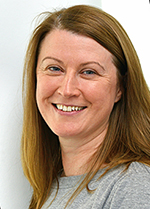
Claire is central to the day-to-day running of the Whitelaw lab and is involved in several research projects. Her role within the Whitelaw group is to provide technical assistance to all lab-active staff in the team and participates in various experimental projects involving molecular and cell biology techniques, currently focussing on the design, construction and analysis of CRISPRs.
Past members
- Vrushali Patil (Post-doc)
- Lin Tan (intern)
- Audrey Law (intern)
- Rachel Huddard (PhD)
- Maeve Ballantyne (PhD)
- Alex Brown (PhD)
- Wenfang (Spring) Tan (Post-doc)

